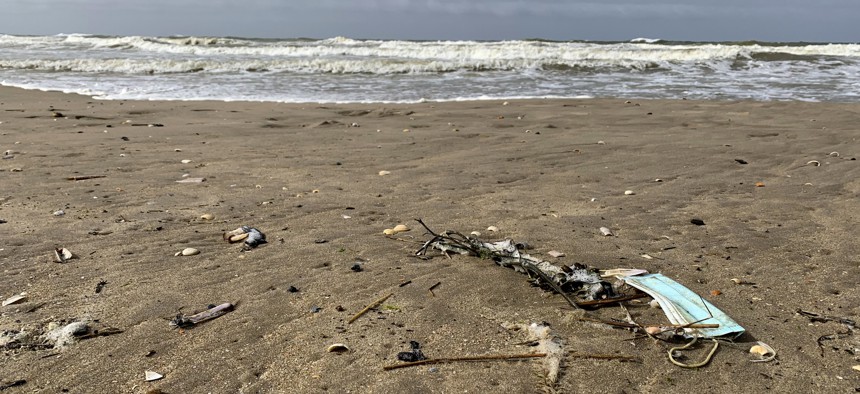Cities Battle Another Long-Lasting Covid Reminder: PPE Litter

AP Photo/Virginia Mayo
Discarded masks and plastic gloves are turning up on beaches and in waterways with increasing frequency.
A beach vacation might sound like the perfect way for vaccinated Americans to put the coronavirus behind them this summer. But it will be hard to escape reminders of the pandemic on the sandy shores.
Discarded face masks, plastic gloves and other personal protective equipment (PPE) are washing up on beaches and increasingly being found in waterways across the United States, raising concern among scientists about the effects of the litter on the environment.
The Ocean Conservancy, which organizes the annual International Coastal Cleanup, began tracking the amount of PPE found during cleanup events in late July. Volunteers have collected 107,219 individual pieces of PPE from beaches and waterways across the globe since then, according to a report released last month.
Fall beach cleanups in New Jersey resulted in the collection of more than 1,100 pieces of PPE, according to a recent report from Clean Ocean Action. That was out of more than 185,000 pieces of litter collected and logged by volunteers.
More than 500 pieces of PPE were collected in Virginia waterway cleanups last year, said Katie Register, executive director or Clean Virginia Waterways. Surgical facemasks, made up of polymeric materials, pose a particular threat.
“The masks, the top and bottom layers, are both flexible plastics,” said Register, who is working on a report on the prevalence of PPE litter in the state. “Like any other plastic, once they get into the environment they start to break up into smaller pieces of plastic.”
Those tiny “microplastics” can be ingested by shellfish and small fish. While the long-term effects of microplastics on wildlife and ecosystems are still being studied, scientists are concerned that they can harm the digestive tracts of animals that ingest them or encourage the spread of dangerous bacteria, said Chris Moore, a senior scientist with the Chesapeake Bay Foundation in Maryland.
The foundation’s annual cleanup event is scheduled for the end of May, and the organization collects data on the type of litter picked up by volunteers.
Some cities have sought to crack down on coronavirus-related littering by increasing fines for littering PPE like face masks and gloves.
Last month, the city council in Boca Raton, Florida voted to raise fines for people who litter personal protective equipment. The standard littering fine is $50, but citizens caught throwing masks, gloves or face shields on the ground in Boca Raton could face fines of up to $250.
The Los Angeles City Council similarly raised fines from $200 to $250 for PPE littering last year.
In Washington, D.C., residents complained to the district’s attorney general that health care workers at a local hospital were throwing discarded gloves and masks on city streets. The complaints prompted the attorney general to write to the hospital, warning the facility it could face potential penalties for violating local dumping laws if the problem was not addressed.
Other localities have incorporated information about PPE litter into public education campaigns.
“There is the need for education about how to dispose of these properly,” Moore said.
Atlanta’s public works department published guidance for how to safely handle PPE during litter cleanup events. The guide recommends picking up PPE with a litter stick or another collection device when possible. If items like masks must be collected by hand, it recommends using gloves and discarding the gloves after the item is collected.
Improperly discarded PPE isn’t the only pandemic-related litter problem local governments face.
As restaurants transitioned from indoor dining to takeout sales, use of disposable food containers and other to-go items spiked.
“That was a noticeable impact,” Register said. “A lot of people who were eating off of washable dishes were suddenly getting disposable containers and when we increase use of certain plastics, we increase plastic litter unfortunately.”
Andrea Noble is a staff correspondent with Route Fifty.
NEXT STORY: A First-of-its-kind Investment in Home Care is in the Works. But Will it be Enough?





